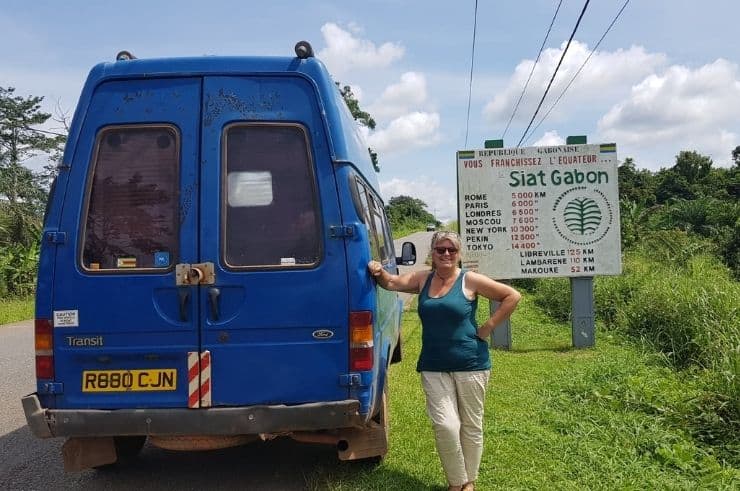
A few days ago, I had the pleasure of interviewing an extraordinary and inspiring woman named Dot Bekker.
Born and raised in Zimbabwe, Dot left in 1981 after the Entumbane uprising and moved to Cape Town, South Africa and since then she’s also lived in the UK, Portugal and Spain before settling down in Luxembourg.
At the age of 58, Dot decided to leave her unhappy marriage and move back to Zimbabwe. In her words “there was no turning back”.
But she wouldn’t just move there, she decided to drive back to Zimbabwe overland via West and Central Africa in a campervan… because? Well, why not!
Over two-and-a-half years, Dot planned and saved for her trip and during that time, she searched for her trusty steed, eventually finding a 20-year-old mechanical 2-wheel drive Ford Transit van which she named BlueBelle.
When she was ready, she set off driving all the way from the UK (where she bought BlueBelle) to Zimbabwe, documenting her trip on her blog, Going Home to Africa. She’s now written a book about her incredible adventures and I caught up with her to find out more about her journey.
Tell me about your route, where did you go?
I drove from the UK to Barcelona where my nephew owns a workshop in construction and design and it was there that I learned to use power tools and I built the interior of the van into a camper.
From Barcelona, I took the ferry to Tangier in Morocco and that’s where my African journey began. I drove through 19 African countries on my way to Zimbabwe, covering 20,000 kilometres over 8-and-a-half months and it was amazing.
I travelled through Morocco, Western Sahara, Mauritania, Senegal, The Gambia, Guinea-Bissau, Guinea, Côte d’Ivoire (Ivory Coast), Ghana, Togo, Benin, Nigeria, Cameroon, Gabon, Republic of the Congo, Democratic Republic of Congo, Angola, Namibia, Botswana and then home to Zimbabwe. You can find a full map of her journey here.
As I was in a 2-wheel drive van, I decided to skip Sierra Leone and Liberia as the visas are very expensive and I’d heard horror stories about the road conditions. I had already driven what I call ‘Hell’s Highway’ which is 200 kilometres of dirt, dust road with big gauges and potholes and I thought if the roads are worse than that, I’m not going to attempt it. Luckily I was driving in the dry season. If I’d been driving in the wet season I wouldn’t have had a chance!
I also skipped Equatorial Guinea as it’s a small country and the visa costs were exceptionally high and it just didn’t really make sense as I was trying to live on $20 per day, where possible, and that included visas.
In hindsight, I would have liked to have spent more time on the route and if I’d had a 4×4 I could have done a lot more and seen a lot more. But, it was great!
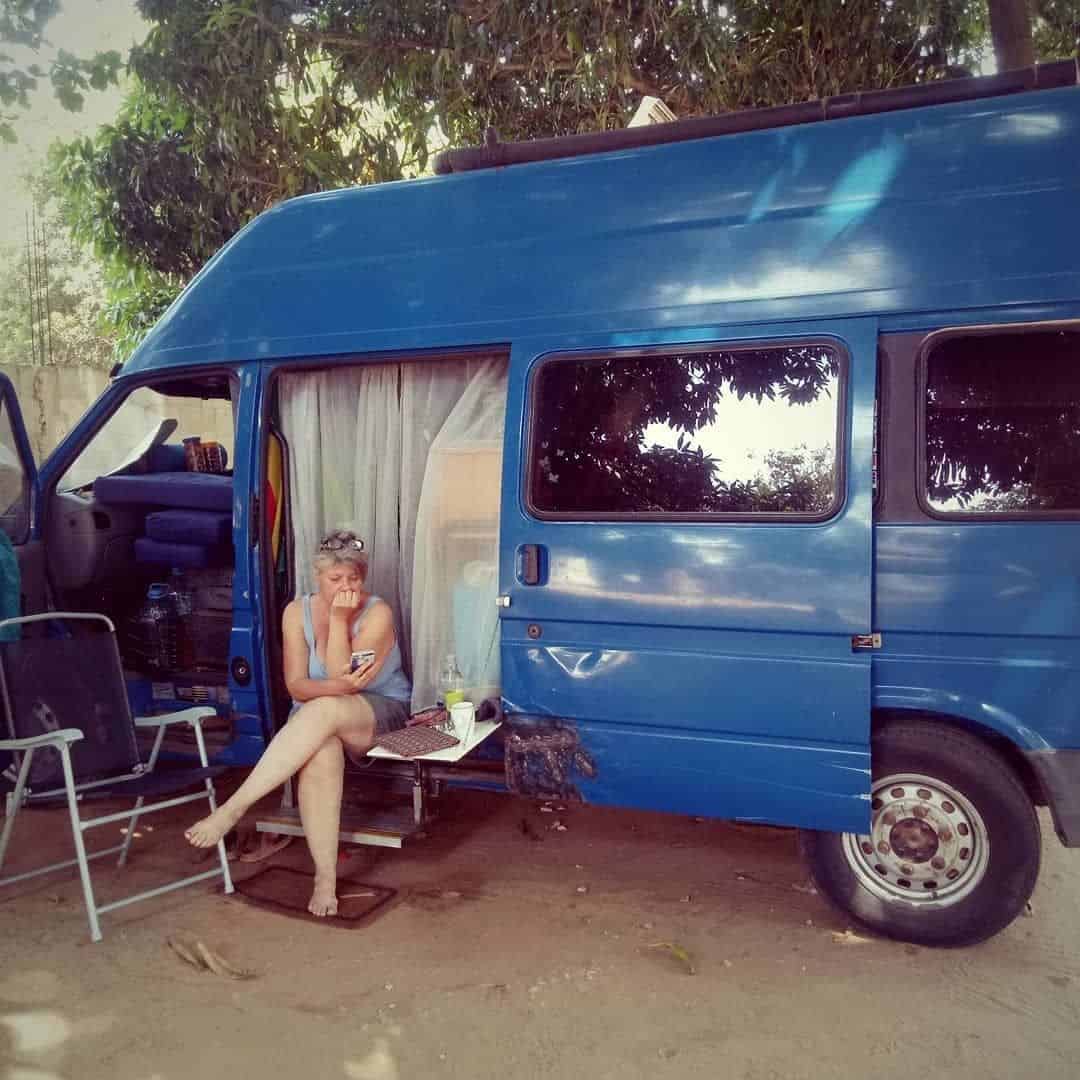
Where did you stay along the route?
I slept in my van every night, I had a toilet and carried everything I needed. I stayed in a lot of church missions where they have secure compounds and space for camping. I also stayed in hotel/motel car parks… although I use the term ‘hotel’ loosely.
I used the iOverlander app to find places to stay as I went. It was brilliant. There were times that there was just nothing, but most of the time it was great. I occasionally wild parked, but to be honest, in a lot of the rainforest countries, like Guinea, you couldn’t get off the road.
If I got on the road I’d have to drive all day to get to the next city or town, unless I stayed in a village and I tried not to stay in villages as I’d attract too much attention. But I’d literally have to drive all day as there’s nowhere that you can just pull over as there’s just road and nothing… so it wasn’t that often that I wild camped.
I met people along the way and they invited me to stay in their places, so I had a variety of experiences and only the occasional campsite or campements – it’s very different from overlanding and camping in Southern Africa, they’re poles apart.
There was only one time when I stayed in a village because there was literally nowhere else to stay.
(Helen: Many overlanders bush camp, especially when travelling in remote areas in their 4×4’s however you should always be careful and ask permission if you are on someone’s land and be aware of security advice of the area. Wild camping in cities is not advised and you should look for somewhere secure)
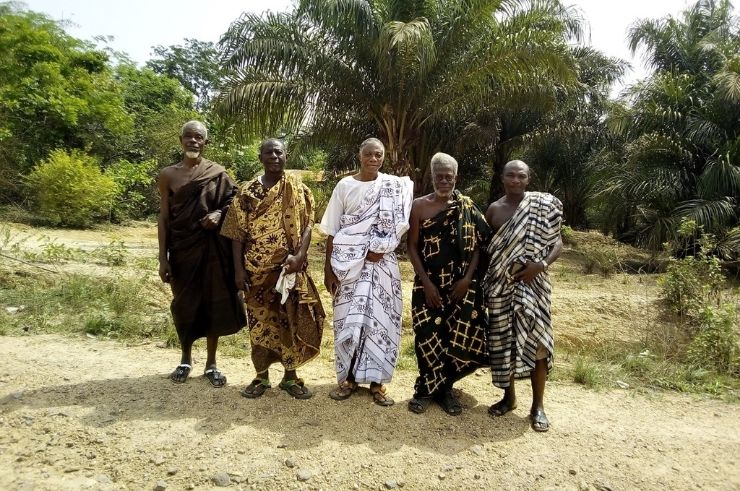
What was your favourite part of your journey?
It’s not one specific thing, but when I started out on this journey, I wasn’t particularly happy with myself or the world, but once I got to Sub-Saharan Africa, I really felt at home. As soon as a got to Senegal, I could smell Africa. I was like, this is the Africa that I know.
But the thing that I loved the most was, as I was driving along, I would pass people and I would wave and smile. And they would wave back and smile. And with that one simple gesture saved my life. It completely transformed my life because they gave me such joy and hope by responding to me with such warmth. It was a real gift.
And that’s the thing I love about Africa, is that the people are incredibly warm. I still wave at everyone now that I’m home in Zimbabwe.
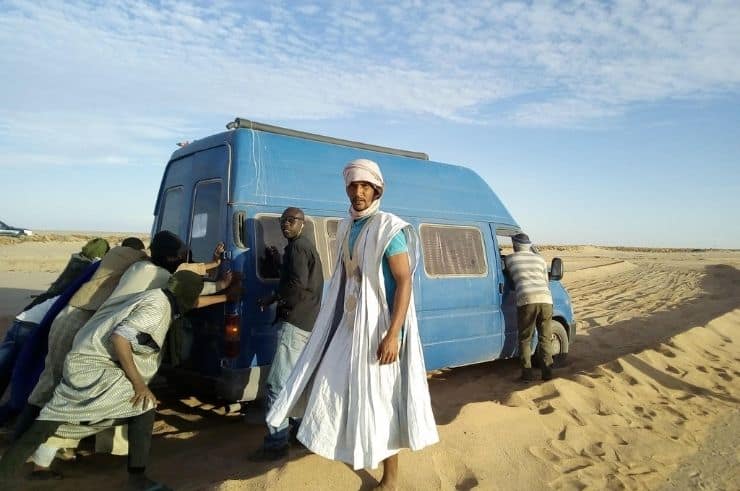
What was the most difficult part of your journey?
The heat!!! The heat in West Africa is something else. I had no toxins left in my body. I’ve never sweated so much in my life. You would get out of the shower, dry yourself and by the time you put your clothes on you’re already wet again.
The heat in West Africa just punished me. It really, totally, and utterly punished me. It was overwhelming. I’d do my chores, like washing my clothes as early in the day as possible, as soon as it got light. Because by the time it got to 10 am, it was too hot to do anything.
It’s a very different heat to what we have here in Zimbabwe where we often have hot days and cool nights. In West Africa, it’s hot all the time.
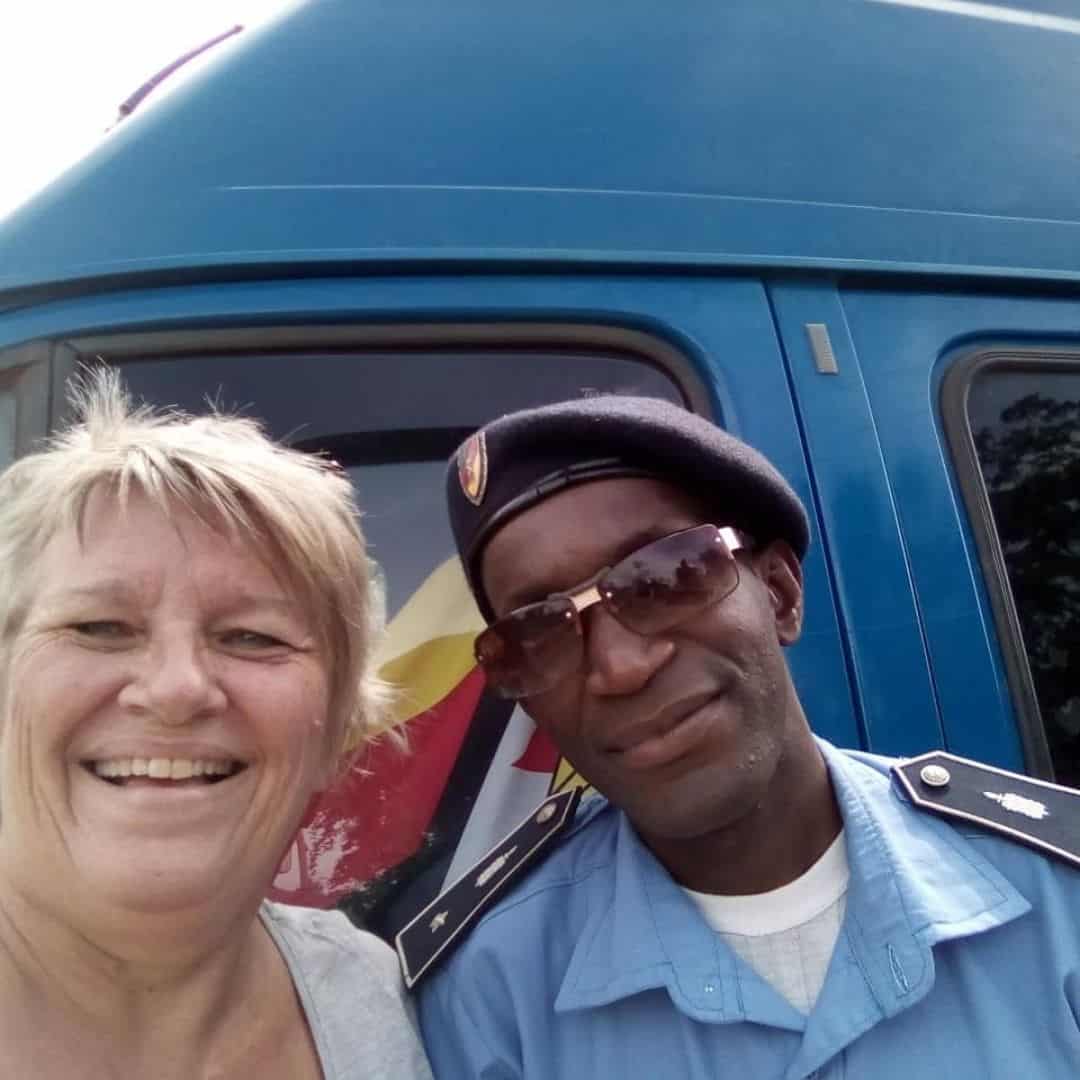
Did you ever feel lonely on your trip?
The thing about Africa, is you’re never alone. You think you’re alone and truly you’re never alone. If I was sitting at a table by myself, there was always someone who wanted to sit down and talk to me. I met a lot of people. On any given day, I’d go through five or more checkpoints.
We’d exchange pleasantries and then they’d always be shocked and ask “Are you on your own?” Then they’d tell me that I needed a man, needed a husband or a driver. I’d tell them that I was fine and that I’d gotten this far without one! Every day I would meet people.
If I was parked up somewhere I’d talk to the staff. I think Africa is the least lonely place you can be.
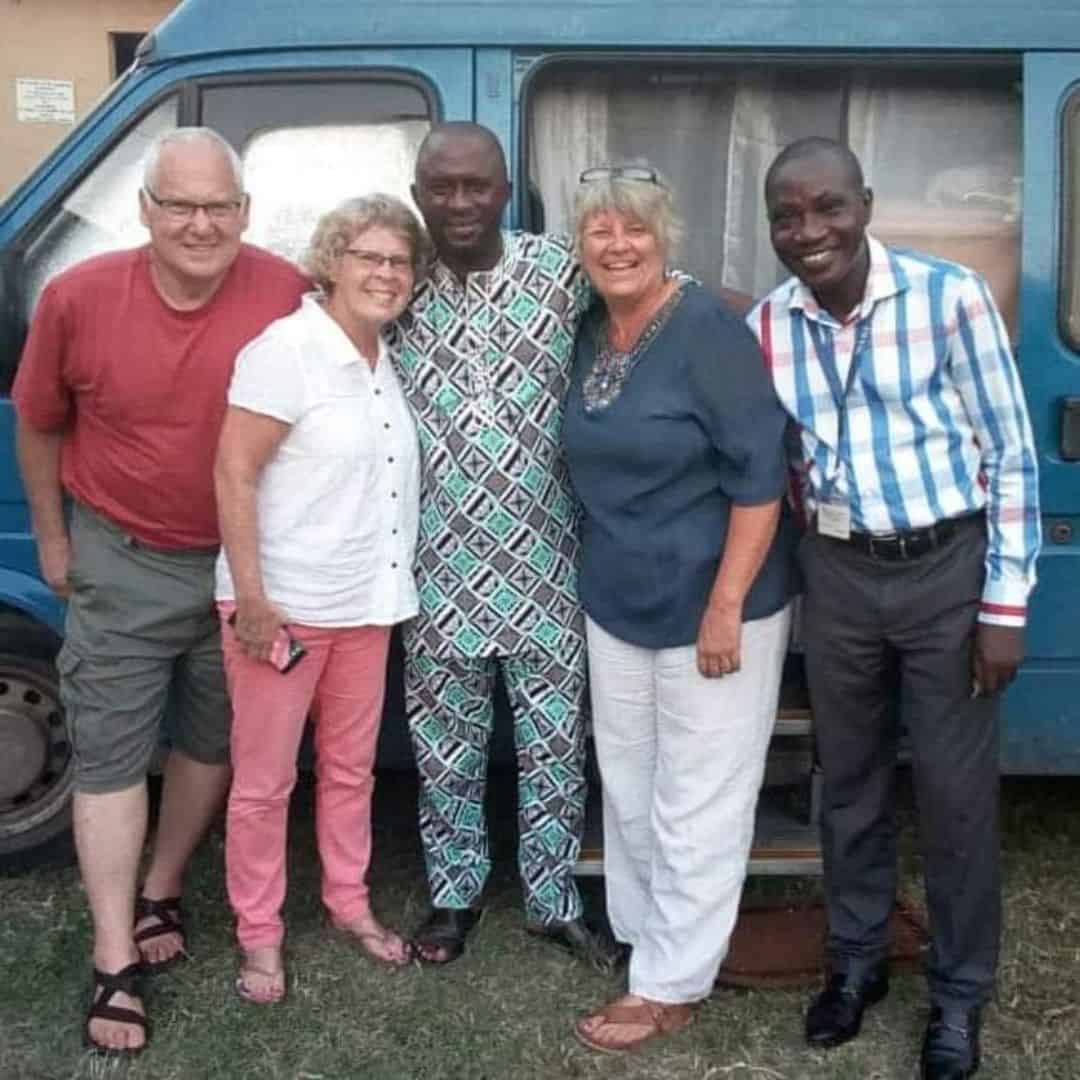
Did you meet many other overlanders, backpackers, or tourists on the route?
Yeah. I mean I met many local people, but I met a number of overlanders and we crisscrossed because we were on the same journey. So I’d meet them and then meet them again several countries later.
I went through Nigeria with an American couple. We met in Morocco and then we caught up again in Benin and then we decided that we would travel together through Nigeria because I didn’t know whether I could make it through the GPS track. There’s no map… just a GPS track to get from Nigeria to Cameroon, so I didn’t know if I could do that road. So we buddied up together.
The lady got in my van one day when we went to get our Cameroon visas and was surprised that I only had ‘African air conditioning’ (basically just wind the window down) as they had an air-conditioned car! Welcome to Africa!
There was lots of traffic in Nigeria and I would talk to the traders, the hawkers (the people walking along the road selling all kinds of stuff) out of the window. This is a great way to experience ‘real’ Africa. Just talk to people. I had the best fun. Even at the checkpoints.
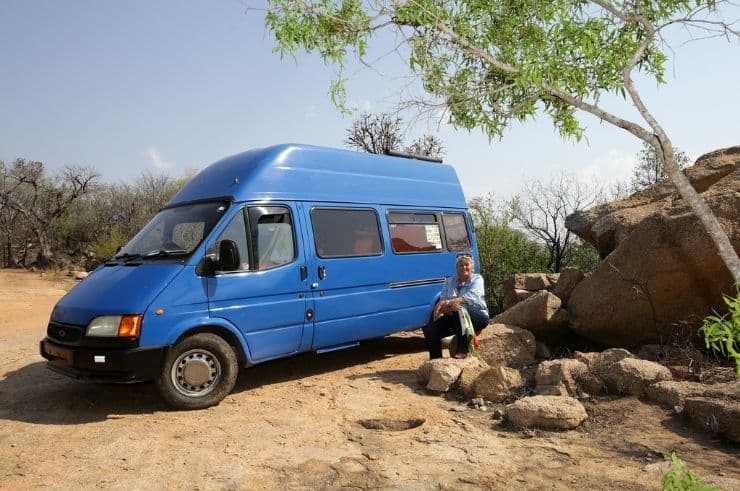
Did you experience much corruption? Were you asked for bribes?
They don’t ask you directly for money. They’ll say “Do you have a gift for us?” – I’d joke and be like “I am the gift!”
There were lots of chancers. There were times as I wrote the book when I became blatantly aware that a bribe would have gotten me out of this situation but I’m obstinate. I think being older helped, as there is a culture of respecting your elders and I’m a particularly stubborn older woman.
I’d be like “I have no idea what the hell you want from me!” Coupled with the fact that I don’t speak French very well, I would use that to my advantage. The more I spoke English and the more confused I looked, they soon realised they weren’t going to get anything from me. How can they be subtle about asking for money when I don’t understand what they’re asking.
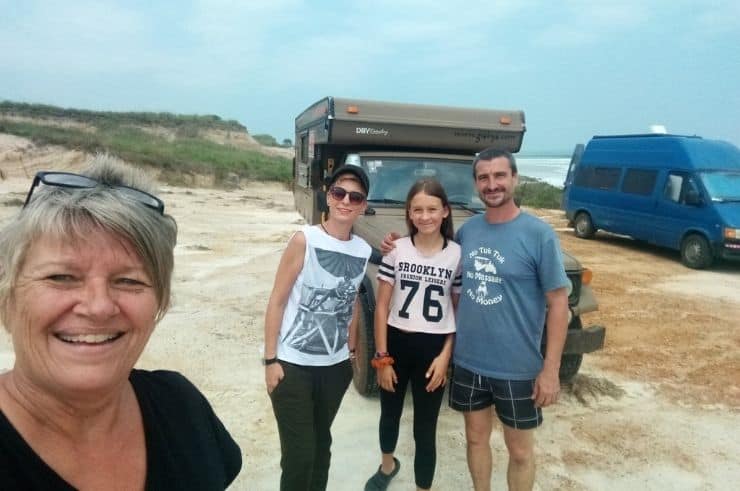
What was your favourite country you visited?
I don’t have a favourite. Each one had something unique, interesting and amazing.
My least two favourite countries were Mauritania because it was so dry, and the roads were terrible and Cameroon. Having come from Nigeria where the people were so friendly, so amazing and so funny then to go to Cameroon where people would rarely smile or wave at you was tough.
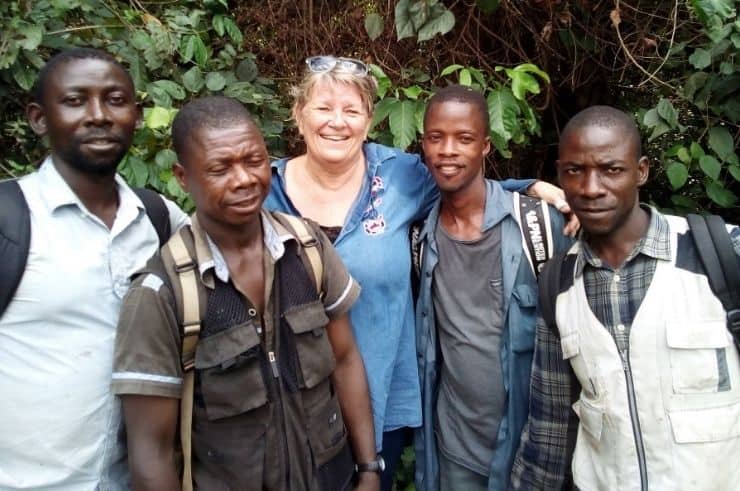
Did you do a lot of sightseeing or do any touristy things along the way?
I didn’t do a lot of the touristy stuff as I was able to drive through the cities and see things as I went.
In Ghana I went on safari to Mole National Park and in Guinea, I went to see the chimpanzees and that was a big expense for me but it was totally worth it. Seeing African wildlife in nature is just a huge thrill. Obviously, in Southern Africa, I get to see all the other stuff, but I wouldn’t get to see chimpanzees.
I didn’t go gorilla trekking, I was going to try in Cameroon but I didn’t end up seeing them. (Helen: Check out the documentary Bama and the Lost Gorillas about gorillas in Cameroon)
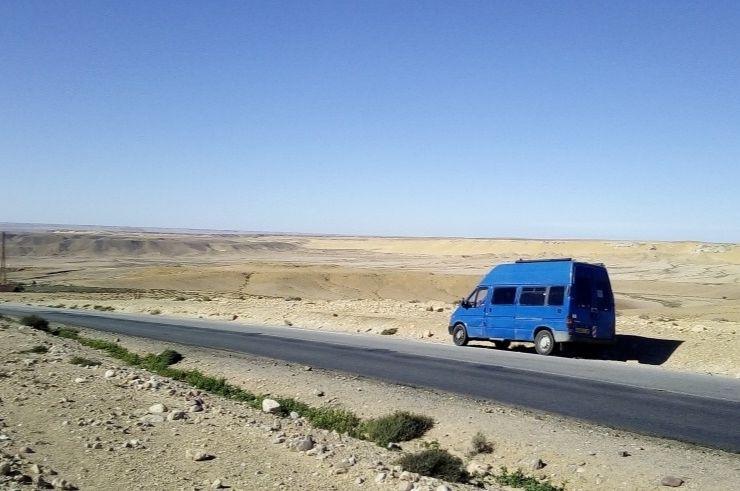
Did you travel with a Carnet de Passages?
No. It’s very difficult to do the trip without a Carnet, but I managed to achieve it. I was paying for Temporary Import Permits as I went, but that was 18 months ago…
